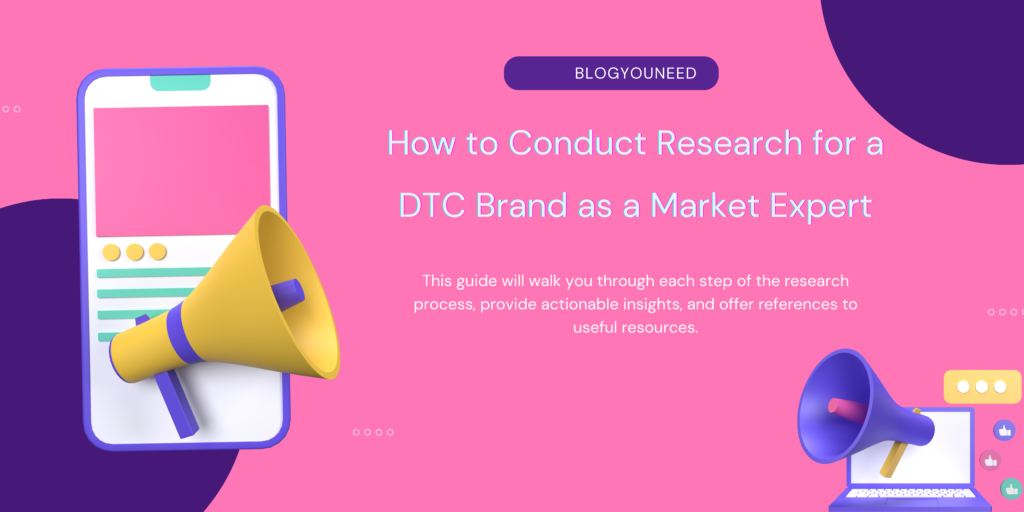
In the world of Direct-to-Consumer (DTC) brands, thorough market research is pivotal for success. Whether you’re a seasoned market expert or a budding entrepreneur, understanding the steps to conduct effective research can help you make informed decisions, identify opportunities, and avoid potential pitfalls. This guide will walk you through each step of the research process, provide actionable insights, and offer references to useful resources.
Table of Contents
1. Define Your Objectives
Step 1: Establish Clear Goals
Before diving into the research, clearly define what you aim to achieve. Objectives could include:
- Understanding your target audience
- Identifying market trends
- Analyzing competitors
- Gauging demand for your product
Reference: MindTools – Setting Objectives
2. Identify Your Target Audience
Step 2: Audience Segmentation
Segment your audience based on demographics, psychographics, and behavior. Tools like Google Analytics, Facebook Audience Insights, and surveys can help you gather this data.
Reference: HubSpot – Audience Segmentation
3. Conduct Market Analysis
Step 3: Industry Trends and Market Size
Research current industry trends, market size, and growth potential. Reports from sources like Statista, Nielsen, and IBISWorld can provide valuable insights.
Reference: Statista, IBISWorld
4. Competitive Analysis
Step 4: Identify and Analyze Competitors
Identify your main competitors and analyze their strengths, weaknesses, opportunities, and threats (SWOT analysis). Tools like SEMrush, Ahrefs, and SimilarWeb can be instrumental.
Reference: SEMrush, Ahrefs, SimilarWeb
5. Customer Feedback and Surveys
Step 5: Collect and Analyze Feedback
Gather feedback directly from your potential customers through surveys, focus groups, and social media listening. Platforms like SurveyMonkey and Typeform can facilitate this process.
Reference: SurveyMonkey, Typeform
6. Utilize Social Media and Online Communities
Step 6: Engage with Online Communities
Participate in relevant forums, social media groups, and online communities to understand the needs and preferences of your target audience. Reddit, Facebook Groups, and niche forums are great places to start.
Reference: Reddit, Facebook Groups
7. Analyze Consumer Behavior
Step 7: Behavioral Analytics
Use tools like Google Analytics, Hotjar, and Mixpanel to track and analyze consumer behavior on your website. Understanding how users interact with your site can provide valuable insights into their preferences and pain points.
Reference: Google Analytics, Hotjar, Mixpanel
8. Product and Pricing Strategy
Step 8: Test and Validate
Test different product and pricing strategies through A/B testing, pilot launches, and market trials. Use platforms like Optimizely or Google Optimize for A/B testing.
Reference: Optimizely, Google Optimize
9. Legal and Regulatory Research
Step 9: Compliance and Regulations
Ensure that your DTC brand complies with all relevant legal and regulatory requirements. Research regulations related to consumer rights, data protection, and product safety.
Reference: FTC – Business Guidance
10. Compile and Analyze Data
Step 10: Synthesize and Interpret Findings
Compile all the data you’ve gathered, synthesize it, and draw actionable insights. Use data visualization tools like Tableau and Power BI to help interpret your findings.
Conclusion
Conducting comprehensive research for a DTC brand involves a multi-step process that covers understanding your audience, analyzing the market, studying competitors, gathering customer feedback, and much more. By following these steps and leveraging the referenced tools and resources, you can build a strong foundation for your DTC brand’s success.
For further reading, explore these additional resources:
This blog post is a comprehensive guide designed to equip you with the knowledge and tools necessary to conduct effective market research for a DTC brand. By following these steps, you’ll be well-prepared to make informed decisions and steer your brand towards success.
